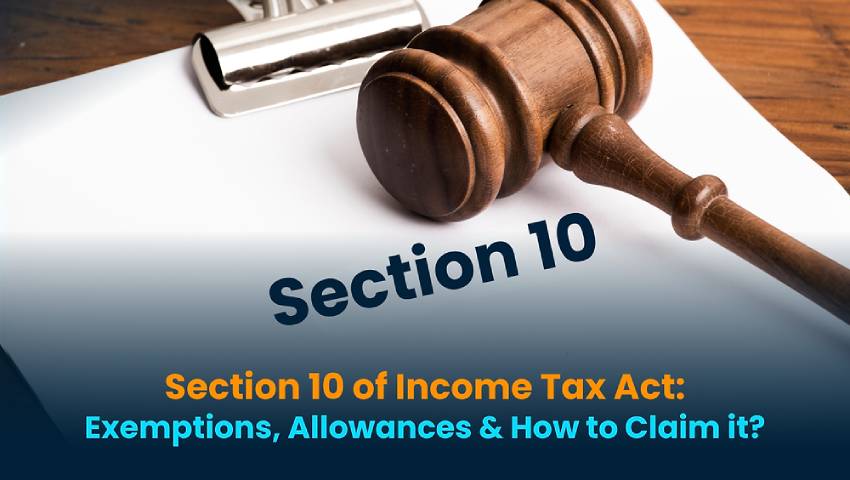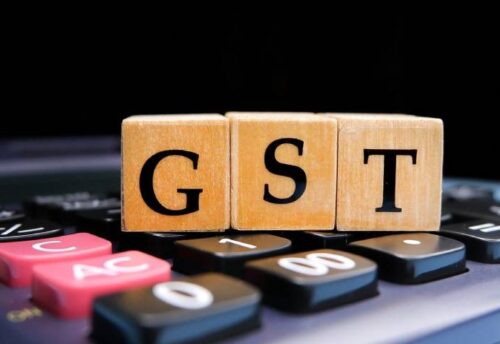
- 08/01/2025
- MyFinanceGyan
- 241 Views
- 4 Likes
- Tax
A Complete Guide to Section 10 of the Income Tax Act: Exemptions You Should Know
Exemptions work a big favor where saving on taxes is involved. Perhaps one of the key sections of the Income Tax Act, 1961, is Section 10. It grants a comprehensive set of incomes that are completely or partly exempt from taxation. By utilizing these exemptions, taxpayers have the option of lawfully shrinking their taxable incomes and saving tax. Nevertheless, these advantages hold good only in the old tax regime and not the new one.
If you want to learn how to legally minimize your tax burden, this guide will guide you through the most important provisions of Section 10 of the Income Tax Act.
What is Section 10 of the Income Tax Act?
Section 10 lays down different kinds of income that are exempt from tax. The purpose of this section is to grant tax relief on certain income streams, thus lessening the tax burden on individuals. The exemptions mentioned under Section 10 include a broad spectrum of income sources, including salary components (such as HRA and gratuity), agricultural income, scholarships, and so on.
If you have income that is in any of these categories, you can claim tax exemptions under Section 10 and save considerable tax on your income.
Common Income Exemptions Under Section 10:
Here’s an elaboration of the most common exemptions under Section 10:
Exemption on House Rent Allowance (HRA) – Section 10(13A):
HRA exemptions are one of the most popular ones used by salaried personnel. The amount that can be exempted is calculated based on the following criteria:
- The actual HRA received.
- 50% of your salary (for people residing in metro cities) or 40% (for non-metro cities).
- The amount by which rent paid is more than 10% of your salary.
If your employer doesn’t give you HRA but you continue to pay rent, you can claim tax relief under Section 80GG. For this, you’ll require rent receipts, a rent agreement, and evidence of monthly payments.
Exemption on Agricultural Income – Section 10(1):
Income earned from farm-related activities like farming, irrigation, or cultivation is exempt entirely from tax. But if your agricultural income is more than ₹5,000 and your non-agricultural income is above the basic exemption threshold, partial integration will be used to calculate your tax burden.
Partial integration taxes non-agricultural income based on total income, including agricultural income.
Exemption on Leave Travel Allowance (LTA) – Section 10(5):
You are entitled to claim LTA on holiday travel expenses incurred by yourself and your relatives, subject to the condition that the travel is done within India. The exemption is only on two journeys during a span of four years and only on travel expenses, not on accommodation or other costs.
Exemption on Gratuity – Section 10(10):
Gratuity paid to employees on retirement or resignation is tax-exempt. The amount of exemption varies based on whether the employee is covered by the Payment of Gratuity Act:
- Covered employees: Exemption is 15 days’ salary for every completed year of service.
- Non-covered employees: Minimum of the following is exempt:
- Actual gratuity paid.
- ₹20 lakh.
- Half a month’s salary for every completed year of service.
Exemption on Educational Scholarships – Section 10(16):
Scholarships received for education are fully exempt from tax under Section 10(16). This exemption applies regardless of whether the scholarship is from a private institution or a public source.
Exemption on Income from Minor Children – Section 10(32):
Income received by minor children from investments or otherwise is aggregated with the parent’s income. Still, an exemption to the extent of ₹1,500 per child can be claimed for a maximum of two children.
Exemption on Profit Sharing from a Partnership Firm – Section 10(2A):
As a partner in a partnership firm, your share of profit is completely tax-free. The reason is that the profits of the firm are already taxed at the firm level.
Exemption on Retrenchment Compensation – Section 10(10B):
If you are retrenched, compensation received by you can be exempted up to the lower of:
- Actual compensation received.
- ₹5 lakh.
- 15 days’ salary for every year of service completed.
Retrenchment compensation is paid in the event of company retrenchment, restructuring, or closure of business.
Exemption on Income of Members of HUF – Section 10(2):
Members of a Hindu Undivided Family (HUF) are eligible to claim exemptions on income earned by the HUF. Such income is exempt from tax, subject to the condition that it is not earned in an individual capacity.
Key Points to Remember:
Although Section 10 provides considerable relief from taxes, it is important to remember the following:
- Maintain Documentation: Documentation, for example, rent receipts, tickets for travel, and evidence of gratuity payments, must be maintained to avail exemptions.
- Understand Limits and Conditions: Numerous exemptions, including gratuity or retrenchment compensation, come with limits and conditions.
- Seek Professional Advice: A tax consultant can assist in simplifying calculations and ensuring optimal benefits.
Conclusion:
Section 10 of the Income Tax Act gives a lot of exemptions, ranging from HRA to LTA and scholarships so that the assessee can lower its taxable income. Although these exemptions have rules and ceilings, knowing them can make a big difference to maximizing your tax savings and facilitating ITR filing. Always keep yourself in touch with tax laws or take professional advice for correct information.
Disclaimer: This is an educational article and is based on the author’s understanding. Kindly refer to a tax expert or the website of the Income Tax Department for the current information.



